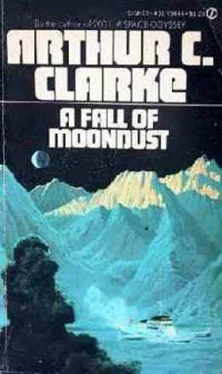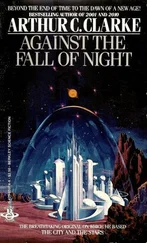Arthur Clarke - A Fall of Moondust
Здесь есть возможность читать онлайн «Arthur Clarke - A Fall of Moondust» весь текст электронной книги совершенно бесплатно (целиком полную версию без сокращений). В некоторых случаях можно слушать аудио, скачать через торрент в формате fb2 и присутствует краткое содержание. Жанр: Фантастика и фэнтези, на английском языке. Описание произведения, (предисловие) а так же отзывы посетителей доступны на портале библиотеки ЛибКат.
- Название:A Fall of Moondust
- Автор:
- Жанр:
- Год:неизвестен
- ISBN:нет данных
- Рейтинг книги:5 / 5. Голосов: 1
-
Избранное:Добавить в избранное
- Отзывы:
-
Ваша оценка:
- 100
- 1
- 2
- 3
- 4
- 5
A Fall of Moondust: краткое содержание, описание и аннотация
Предлагаем к чтению аннотацию, описание, краткое содержание или предисловие (зависит от того, что написал сам автор книги «A Fall of Moondust»). Если вы не нашли необходимую информацию о книге — напишите в комментариях, мы постараемся отыскать её.
A Fall of Moondust — читать онлайн бесплатно полную книгу (весь текст) целиком
Ниже представлен текст книги, разбитый по страницам. Система сохранения места последней прочитанной страницы, позволяет с удобством читать онлайн бесплатно книгу «A Fall of Moondust», без необходимости каждый раз заново искать на чём Вы остановились. Поставьте закладку, и сможете в любой момент перейти на страницу, на которой закончили чтение.
Интервал:
Закладка:
He moved back to his seat, and started the motors once more.
“Nothing much to see for the next sixty kilometers”, he called over his shoulder, “so we'll get a move on.”
Selene surged forward. For the first time, there was a real sensation of speed. The boat's wake became longer and more disturbed as the spinning fans bit fiercely into the dust. Now the dust itself was being tossed up on either side in great ghostly plumes; from a distance, Selene would have looked like a snowplow driving its way across a winter landscape, beneath a frosty moon. But those gray, slowly collapsing parabolas were not snow, and the lamp that lit their trajectory was the planet Earth.
The passengers relaxed, enjoying the smooth, almost silent ride. Every one of them had traveled hundreds of times faster than this, on the journey to the Moon. But in space one was never conscious of speed, and this swift glide across the dust was far more exciting. When Pat swung Selene into a tight turn, so that she orbited in a circle, the boat almost overtook the falling veils of powder her fans had hurled into the sky. It seemed altogether wrong that this impalpable dust should rise and fall in such clean-cut curves, utterly unaffected by air resistance. On Earth it would have drifted for hours — perhaps for days.
As soon as the boat had straightened out on a steady course and there was nothing to look at except the empty plain, the passengers began to read the literature thoughtfully provided for them. Each had been given a folder of photographs, maps, souvenirs (“This is to certify that Mr./Mrs./Miss — has sailed the Seas of the Moon, aboard Dust-Cruiser Selene”), and informative text. They had only to read this to discover all that they wanted to know about the Sea of Thirst, and perhaps a little more.
Most of the Moon, they read, was covered by a thin layer of dust, usually no more than a few millimeters deep. Some of this was debris from the stars — the remains of meteorites that had fallen upon the Moon's unprotected face for at least five billion years. Some had flaked from the lunar rocks as they expanded and contracted in the fierce temperature extremes between day and night. Whatever its source, it was so finely divided that it would flow like a liquid, even under this feeble gravity.
Over the ages, it had drifted down from the mountains into the lowlands, to form pools and lakes. The first explorers had expected this, and had usually been prepared for it. But the Sea of Thirst was a surprise; no one had anticipated finding a dustbowl more than a hundred kilometers across.
As the lunar “seas” went, it was very small; indeed, the astronomers had never officially recognized its title, pointing out that it was only a small portion of the Sinus Roris — the Bay of Dew. And how, they protested, could part of a bay be an entire sea? But the name, invented by a copywriter of the Lunar Tourist Commission, had stuck despite their objections. It was at least as appropriate as the names of the other so-called seas — Sea of Clouds, Sea of Rains, Sea of Tranquillity. Not to mention Sea of Nectar.
The brochure also contained some reassuring information, designed to quell the fears of the most nervous traveler, and to prove that the Tourist Commission had thought of everything. “All possible precautions have been taken for your safety”, it stated. “Selene carries an oxygen reserve sufficient to last for more than a week, and all essential equipment is duplicated. An automatic radio beacon signals your position at regular intervals, and in the extremely improbable event of a complete power failure, a dust-ski from Port Roris would tow you home with little delay. Above all, there is no need to worry about rough weather. No matter how bad a sailor you may be, you can't get seasick on the Moon. There are never any storms on the Sea of Thirst; it is always a flat calm.”
Those last comforting words had been written in all good faith, for who could have imagined that they would soon be proved untrue?
As Selene raced silently through the earthlit night, the Moon went about its business. There was a great deal of business now, after the aeons of sleep. More had happened here in the last fifty years than in the five billion before that, and much more was to happen soon.
In the first city that Man had ever built outside his native world, Chief Administrator Olsen was taking a stroll through the park. He was very proud of the park, as were all the twenty five thousand inhabitants of Port Clavius. It was small, of course — though not as small as was implied by that miserable TV commentator who'd called it “a windowbox with delusions of grandeur.” And certainly there were no parks, gardens, or anything else on Earth where you could find sunflowers ten meters high.
Far overhead, wispy cirrus clouds were sailing by-or so it seemed. They were, of course, only images projected on the inside of the dome, but the illusion was so perfect that it sometimes made the C. A. homesick. Homesick? He corrected himself; this was home.
Yet in his heart of hearts, he knew it was not true. To his children it would be, but not to him. He had been born in Stockholm, Earth; they had been born in Port Clavius. They were citizens of the Moon; he was tied to Earth with bonds that might weaken with the years, but would never break.
Less than a kilometer away, just outside the main dome, the head of the Lunar Tourist Commission inspected the latest returns, and permitted himself a mild feeling of satisfaction. The improvement over the last season had been maintained; not that there were seasons on the Moon, but it was noticeable that more tourists came when it was winter in Earth's northern hemisphere.
How could he keep it up? That was always the problem, for tourists wanted variety, and you couldn't give them the same thing over and over again. The novel scenery, the low gravity, the view of Earth, the mysteries of Farside, the spectacular heavens, the pioneer settlements (where tourists were not always welcomed, anyway) — after you'd listed those, what else did the Moon have to offer? What a pity there were no native Selenites with quaint customs and quainter physiques at which visitors could click their cameras. Alas, the largest life form ever discovered on the Moon needed a microscope to show it — and its ancestors had come here on Lunik 11, only a decade ahead of Man himself.
Commissioner Davis riffled mentally through the items that had arrived by the last telefax, wondering if there was anything there that would help him. There was, of course, the usual request from a TV company he'd never heard of, anxious to make yet another documentary on the Moon — if all expenses were paid. The answer to that one would be “No”; if he accepted all these kind offers, his department would soon be broke.
Then there was a chatty letter from his opposite number in the Greater New Orleans Tourist Commission, Inc., suggesting an exchange of personnel. It was hard to see how that would help the Moon, or New Orleans either, but it would cost nothing and might produce some good will. And — this was more interesting — there was a request from the water-skiing champion of Australia, asking if anyone had ever tried to ski on the Sea of Thirst.
Yes — there was definitely an idea here; he was surprised that someone had not tried it already. Perhaps they had, behind Selene or one of the small dust-skis. It was certainly worth a test; he was always on the lookout for new forms of lunar recreation, and the Sea of Thirst was one of his pet projects.
It was a project that, within a very few hours, was going to turn into a nightmare.
CHAPTER 2
Ahead of Selene, the horizon was no longer a perfect, unbroken arc; a jagged line of mountains had risen above the edge of the Moon. As the cruiser raced toward them, they seemed to climb slowly up the sky, as if lifted upon some gigantic elevator.
Читать дальшеИнтервал:
Закладка:
Похожие книги на «A Fall of Moondust»
Представляем Вашему вниманию похожие книги на «A Fall of Moondust» списком для выбора. Мы отобрали схожую по названию и смыслу литературу в надежде предоставить читателям больше вариантов отыскать новые, интересные, ещё непрочитанные произведения.
Обсуждение, отзывы о книге «A Fall of Moondust» и просто собственные мнения читателей. Оставьте ваши комментарии, напишите, что Вы думаете о произведении, его смысле или главных героях. Укажите что конкретно понравилось, а что нет, и почему Вы так считаете.












